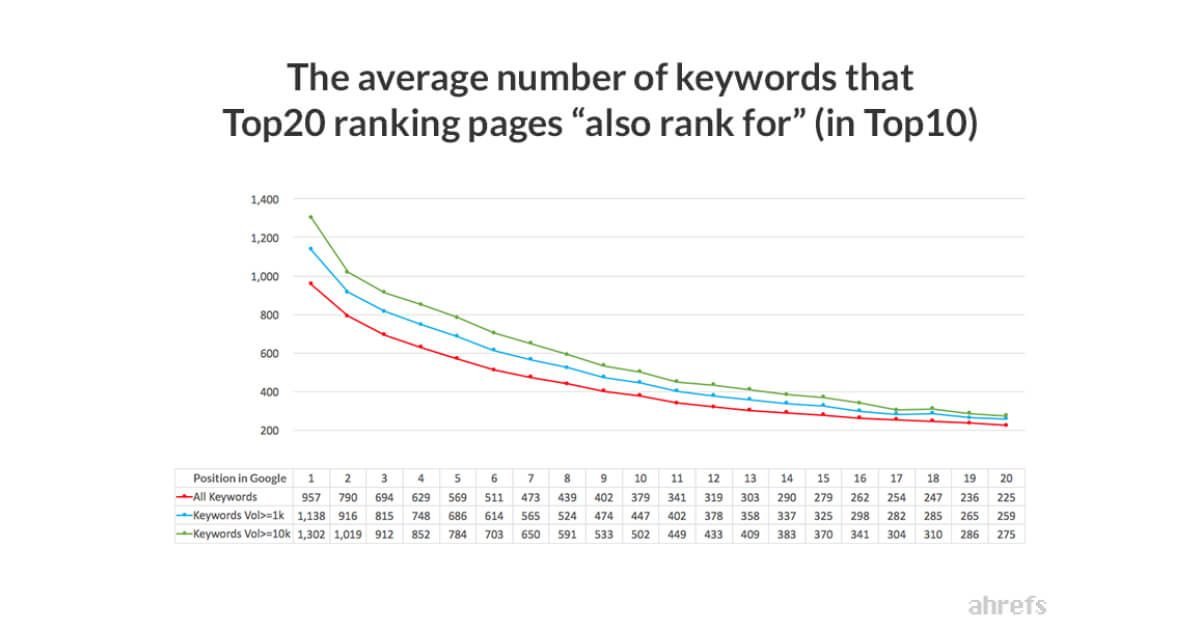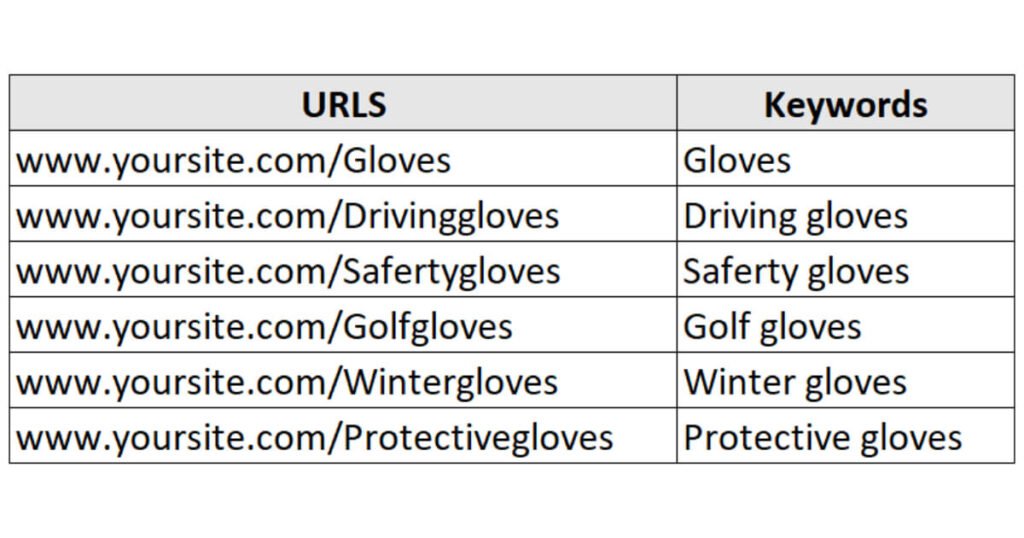Before creating the content, it is important to understand how many keywords per page you should focus. SEO experts suggest targeting one primary keyword per page would be more beneficial. However, if you are pondering things like:
What will be the ideal keyword density? How many keyword phrases you should target per page? How many keywords your site can rank for?
Then this post is for you.
Choosing the right Keyword
Keywords are the ideas and subjects that define your article or page. In SEO, they’re the words and phrases that people type into search engines, which are referred to as “search queries”. Try to maintain your keywords relevant to what people are looking for, as this will enhance the likelihood of your page being found in the search results.
What are the terms that people are looking for?
Your first step of choosing the right keyword will begin with Keyword Research. Keyword research is determining which keywords apply to your business and determining how you rank for these phrases. It can provide you with a lot of information about what your target audience is looking for on Google.
Sometimes, your content could be great, but your page may not get ranked as people are not searching for those keywords. Hence, before deciding on your content, it is better to start with keyword research. Choosing the right keyword will not only determine the amount of traffic generated but also determine the quality of that traffic. You can use the below 5 point checklist as a guide for choosing keywords:
5 point checklist:
- Search demand – The chosen keyword must have an adequate search volume.
- Traffic Potential – Besides search volume, the keyword must also drive traffic to the page. Search volume without traffic is not so good.
- Business potential – This is the value a keyword has to your business. The chosen keyword must be of high value to your business.
- Searcher Intent – See if the keywords match searcher intent.
- Ranking difficulty -Ranking difficulty relates to the backlink profile of the competing domain or page. Understand who you will be up against before targeting a keyword.
How many keyword for SEO you need to target?
Concentrate on one major keyword and two or three SEO keyword variations on each page. You should focus each page on a particular topic while including the most significant keyword variations for SEO purposes.
Make your keywords as specific as possible, and only use variations of a keyword if they make natural sense. Don’t squeeze too many keywords into one page for a single topic. With that level of clarity, you can be confident that you’ll be able to best satisfy your user’s wants and requirements.

Be as specific as possible, even if it’s a general page with connections to other related topics. Once you’ve done that, your site’s content will be hyper-targeted to long-tail keywords.
Relationship between Search Volume and How many SEO keywords to use
When selecting variations of the main keyword, choose keywords with a large search volume and low competition.
So, what does a high search volume imply? It is a statistic unique to you, your keywords, and your industry. It might be anywhere from 20,000 to 30 searches every month. Use the search volumes as a metric for comparison, and don’t get too caught up in the figures. The tools used to collect such numbers aren’t ideal. So instead, compare your terms to one another using the metrics.
You’ll be able to develop more links per keyword if you target fewer keywords, which means faster ranks for those keywords.
How many keywords you can rank for?
Though you focus only on a primary keyword with certain variations, it doesn’t mean that you will rank for only those few sets of keywords. Each page will eventually rank for a lot more keywords than the one major keyword you chose for it. However, focusing on a primary keyword keeps your page concentrated on a single topic.
On this topic, Ahref conducted a keyword ranking analysis and reported, “It looks like the average #1 ranking page will also rank in the top 10 [search results] for nearly 1,000 other relevant keywords. And the lower-ranking pages rank for fewer keywords.”

Usually, the keyword you concentrate on is a broad term. It may be something like “exercise”, which is a broad term. Concentrating on that one phrase will help you improve your rank for that broad term and hundreds, if not thousands, of related long-tail terms.
Long-tail keywords - An effective way to connect with the audience
Long-tail keywords are search terms with a low volume of monthly searches. They are usually longer and much more specific than their “head” equivalents, resulting in a better conversion rate.
For example, the keyword “exercise” is a “head” keyword because it gets around 418k searches per month. The keyword “can you exercise with a broken toe” is a long-tail keyword because it only gets 30 searches per month.


The following are the three reasons which make long-tail keywords so great:
- Long-tail keywords (in general) have a lower level of competition.
- Long-tail keywords are (in general) easier to address.
- There are a lot of them.
Long-tail keyword phrases that are extremely particular do not appear in any keyword research tools, and you may only look at them once every 2-to 3 months. However, they’re crucial because it’s believed that 40 percent of online searches comprise phrases with four or more words. As a result, while individual search numbers for very long-tail keywords may appear insignificant, the collective is far from it.

Hence, you don’t have to be concerned about selecting only one keyword for your page. It simply establishes your focus and provides you with a clear path to follow. You will not be missing out on any opportunities, even if you do not target all variations. Such variances will naturally occur when you produce a high-quality post with a defined emphasis.
How many keywords you can use per page?
You don’t want to include too many keywords on a single page because it will confuse search engines and possibly distract users. Remember that search engines are looking for the best search results, and if a single page covers too many topics, it will hurt you. You also want to predict your users’ intent based on the terms you’re targeting, so they come to your site and find exactly what they’re looking for, and convert swiftly.


At the very least, concentrate on two to three keywords on every page. Try to optimize for additional SEO keyword variations if you can keep the content look natural.
How many keywords you can use per page also depends on the following factors:
- What is the scope of your topic?
- How many monthly searches do the keyword expected to receive?
- What is the search query length that comes after this major keyword?
Relationship between Content length and How many SEO keywords to use
The length of the content will also determine how many keywords you should focus on per page. You can optimize a smaller blog post for two or three keywords, but fixing five or six keywords into a small piece of content will sound strange. However, in a longer article, focusing on five or six keywords is quite practical, while keeping the content sound natural.
To summarise, instead of focusing on a single keyword per page, focus on a single “topic” per page. Once you write content with a single topic as a base, the variations of the focused keywords will naturally get into the content.
What is the ideal Keyword density for SEO?
Once you decide on how many keywords to target per page, the next query you might have is How many times you can repeat that keyword. Which is nothing but determining the keyword density of your content.
Concerning the total text on that page, keyword density refers to the number of times your focus keyword appears in your copy.
With ideal keyword density, there are no hard and fast rules as long as the keyword density percentage is healthy. It varies from 0.5 percent to 0.8 percent for some people. Some analysts believe the figure should be between 0.5 and 2.5 percent. However, most specialists think it should be less than 3%.
This means the target keyword can appear one to two times per hundred words. At this pace, the keyword occurs just enough times to show search engines what the page is about, without involving in keyword stuffing.
Keyword stuffing - Don't let it sabotage your SEO efforts.
Keyword stuffing is the practice of repeating too many keywords on the same page. It is against Google’s quality guidelines, and it can even cause search engine penalties that result in the website being removed from the SERPs. These days crawlers are more sophisticated and can detect any kind of keyword stuffing quite easily.
A too high keyword density can likewise detract from the reader’s experience. It will affect your SEO content’s clarity and readability, forcing users to leave your site in favor of higher-quality pages.

Hence, use your focused keyword to the required frequency, but don’t go overboard. You don’t want Google to assume you’re jamming keywords into your text since that’s a bad idea.
To summarise, many SEO experts believe there is no such thing as an ideal keyword density percentage. Consider keyword optimization in terms of keyword prominence, keyword proximity, and co-occurring keywords in a document, rather than utilizing tools to assess keyword density.
Should I target distinct set of keywords on each page?
On each page, you should not reuse the same keywords. Each page should have its own set of keywords to target. If you use the same keywords on every page, the search engine will rank those pages as competitors, which is referred to as keyword cannibalization. Keyword cannibalization occurs when many pages on a website compete for the same or related keywords, causing the site’s organic performance to deteriorate.

Let’s imagine your website sells gloves and “gloves” is the only keyword you want to rank for. You’re telling Google every page is about gloves, whether they’re driving gloves, safety gloves, golf gloves, or anything else.
You’re competing against yourself for one phrase that may be too broad to have commercial meaning, rather than capitalizing on a bunch of important longer-tail keywords like winter gloves, protective gloves, and so on.
How to deal with Keyword Cannibalization issues.
Fortunately, resolving keyword cannibalization is simple once you’ve recognized the issue. To detect keyword cannibalism, all you have to do is create a keyword matrix.
Simply construct a spreadsheet that contains a list of all of your site’s significant URLs and the keywords that go with them. If your website offers gloves, for example, your spreadsheet would look like this:

On this Google’s John Muller said, “We just rank the content as we get it. If you have a bunch of pages with roughly the same content, it’s going to compete with each other, kinda like a bunch of kids wanting to be first in line, and ultimately someone else slips in ahead of them :). Personally, I prefer fewer, stronger pages over lots of weaker ones – don’t water your site’s value down”.
How many keywords to target depending on the type of page?
Based on the type of page, the strategy for deciding how many keywords to focus on may differ slightly. The following guidelines will help to make your decision:
- Blog Pages: Blog pages are niche-based pages that focus on a specific subject. As a result, only use one primary keyword per page for these pages. Create a title tag and a Meta description tag that are both keyword-focused.
- Landing Pages: Landing pages allow you to concentrate on a smaller group of keywords. You have the option of selecting one keyword family with two to three associated auxiliary words. Create inbound links to the landing pages centering on the target term from the site navigation and the homepage.
- Home page: Many people consider their homepage as a visual marketing tool, with few words on the page. While this may appear attractive from a design aspect, it may hurt your homepage’s SEO and keyword rankings because search engines cannot associate the material with many phrases.
Hence, treat the homepage similarly to any other page on your site in terms of keyword optimization. To gain the best SEO effect, target three to four keywords on the homepage.
Tracking of the targeted keyword
Don’t get too caught up in keeping track of each keyword’s position. Simply use the term as a guide when developing content to ensure you’re focusing on things that people are interested in.
It’s exciting to see if the keyword you selected ranks on the first page, but tracking is not that useful. Location and personalization can have a big impact on search rankings.
Rather than obsessing over keyword rankings, monitor the number of visitors your article receives. If your content is getting views, people are spending time on the page, and transactions are being generated, you know the topic is popular with your audience, and you should develop more of it.
Conclusion:
I hope you found my article on how many keywords to focus on per page useful.
To summarise, choose the right keyword, considering search demand, traffic potential, business value, search intent, and ranking difficulty. On each page, focus on one major keyword along with two or three SEO keyword variations. Target each page with its own set of keywords and keep the keyword density at an ideal level.
I’ve provided you with a framework for determining how many keywords to target every page. However, in digital marketing, we do not write our rules in stone, so someone can come along and wash down the sidewalk. So, you may decide to target significantly more or far fewer keywords than I suggest.
On the whole, just keep your content natural and create it for your audience.
